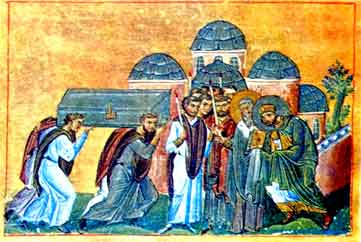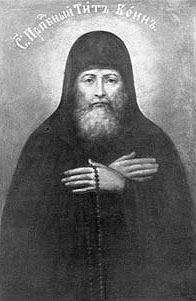|
|
Saint John Chrysostom, The Golden Trumpet Of Orthodoxy The memory of this illuminary of the Church is celebrated on November 13 and January 30 but, on this date, the Church celebrates the translation of his honorable relics from the Armenian village of Comana, where he died in exile, to Constantinople, where earlier he had governed the Church. Thirty years after his death, Patriarch Proculus delivered a homily in memory of his spiritual father and teacher. He so enflamed the love of the people and Emperor Theodosius the Younger toward this great saint that all of them desired that Chrysostom"s relics be translated to Constantinople. It was said that the sarcophagus, containing the relics of St. John Chrysostom, did not allow itself to be moved from its resting place until the emperor wrote a letter to Chrysostom begging him for forgiveness (for Theodosius" mother, Eudoxia, was the culprit responsible for the banishment of this saint) and appealing to him to come to Constantinople, his former residence. When this letter of repentance was placed on the sarcophagus, its weight became extremely light. At the time of the translation of his relics, many who were ill and who touched the sarcophagus were healed. When the relics arrived in the capital, then the emperor in the name of his mother as though she herself was speaking over the relics, again, prayed to the saint for forgiveness. "While I lived in this transient life, I did you malice and, now, when you live the immortal life, be beneficial to my soul. My glory passed away and it helped nothing. Help me, father; in your glory, help me before I am condemned at the Judgment of Christ!" When the saint was brought into the Church of the Twelve Apostles and placed on the patriarchal throne, the masses of people heard the words from St. Chrysostom"s mouth saying: "Peace be to you all." The translation of the relics of St. John Chrysostom was accomplished in the year 438 A.D. The memory of this illuminary of the Church is celebrated on November 13 and January 30 but, on this date, the Church celebrates the translation of his honorable relics from the Armenian village of Comana, where he died in exile, to Constantinople, where earlier he had governed the Church. Thirty years after his death, Patriarch Proculus delivered a homily in memory of his spiritual father and teacher. He so enflamed the love of the people and Emperor Theodosius the Younger toward this great saint that all of them desired that Chrysostom"s relics be translated to Constantinople. It was said that the sarcophagus, containing the relics of St. John Chrysostom, did not allow itself to be moved from its resting place until the emperor wrote a letter to Chrysostom begging him for forgiveness (for Theodosius" mother, Eudoxia, was the culprit responsible for the banishment of this saint) and appealing to him to come to Constantinople, his former residence. When this letter of repentance was placed on the sarcophagus, its weight became extremely light. At the time of the translation of his relics, many who were ill and who touched the sarcophagus were healed. When the relics arrived in the capital, then the emperor in the name of his mother as though she herself was speaking over the relics, again, prayed to the saint for forgiveness. "While I lived in this transient life, I did you malice and, now, when you live the immortal life, be beneficial to my soul. My glory passed away and it helped nothing. Help me, father; in your glory, help me before I am condemned at the Judgment of Christ!" When the saint was brought into the Church of the Twelve Apostles and placed on the patriarchal throne, the masses of people heard the words from St. Chrysostom"s mouth saying: "Peace be to you all." The translation of the relics of St. John Chrysostom was accomplished in the year 438 A.D.Venerable Titus Of The Monastery Of The Caves In Kiev Ephrem was born in Syria of poor parents during the reign of Emperor Constantine the Great. He spent his young life rather tempestuously; but all at once a change took place in his soul and he began to burn with love for the Lord Jesus. Ephrem was a disciple of St. James Nisibis (January 13). From the enormous Grace of God, wisdom flowed from his tongue as a brook of honey and ceaseless tears flowed from his eyes. Industrious as a bee, Ephrem continually either wrote books or orally taught the monks in the monastery and the people in the town of Edessa or he dedicated himself to prayer and contemplation. Numerous are his books and beautiful are his prayers. The most famous is his prayer recited during the Honorable Fast Season which reads:
Lord and Master of my life, give
me not a spirit of sloth, vain
curiosity, lust for power and idle talk.
But give to me, your servant, a spirit
of soberness, humility, patience and love.
O Lord and King, grant me to see
my own faults and not to condemn
my brother: for blessed are you
to the ages of ages. Amen.
When they wanted to appoint him a bishop by force, he pretended to be insane and began to race through the city of Edessa dragging his garment behind him. Seeing this, the people left him in peace. Ephrem was a contemporary and friend of St. Basil the Great. Saint Ephrem is considered mainly to be the Apostle of Repentance. Even today his works soften many hearts hardened by sin and return them to Christ. He died in extreme old age in the year 378 A.D. Ephrem was born in Syria of poor parents during the reign of Emperor Constantine the Great. He spent his young life rather tempestuously; but all at once a change took place in his soul and he began to burn with love for the Lord Jesus. Ephrem was a disciple of St. James Nisibis (January 13). From the enormous Grace of God, wisdom flowed from his tongue as a brook of honey and ceaseless tears flowed from his eyes. Industrious as a bee, Ephrem continually either wrote books or orally taught the monks in the monastery and the people in the town of Edessa or he dedicated himself to prayer and contemplation. Numerous are his books and beautiful are his prayers. The most famous is his prayer recited during the Honorable Fast Season which reads:
Lord and Master of my life, give
me not a spirit of sloth, vain
curiosity, lust for power and idle talk.
But give to me, your servant, a spirit
of soberness, humility, patience and love.
O Lord and King, grant me to see
my own faults and not to condemn
my brother: for blessed are you
to the ages of ages. Amen.
When they wanted to appoint him a bishop by force, he pretended to be insane and began to race through the city of Edessa dragging his garment behind him. Seeing this, the people left him in peace. Ephrem was a contemporary and friend of St. Basil the Great. Saint Ephrem is considered mainly to be the Apostle of Repentance. Even today his works soften many hearts hardened by sin and return them to Christ. He died in extreme old age in the year 378 A.D.Saint Marciana the QueenWife of Emperor Justin I (518-527), interred in the Church of the Holy Apostles.
Venerable Claudinus
Venerable Peter of Egyptdisciple of Abba Lot (5th century)
|